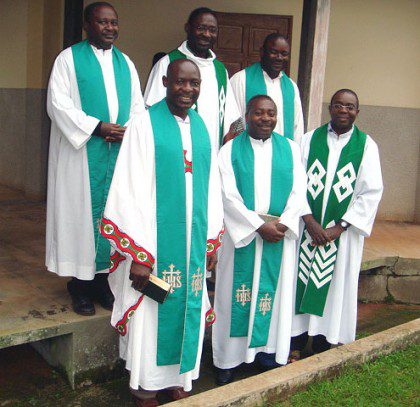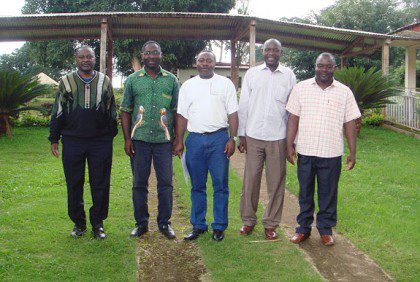
SCJs of Cameroon lead their province
On June 14, Fr. Léopold Mfouakouet became the first African SCJ to serve as provincial superior of the Cameroon Province. He is only the second African SCJ to lead a province; Fr. Carlos Lobo of the Mozambique Province was the first. He is now in his second term.
“I realize that I am both a witness and actor in the growing province of Cameroon,” said Fr. Léopold about his appointment.
Established just over 15 years ago, the Cameroon Province is young. However, the SCJ presence in the country goes back almost 100 years. In 2012 the congregation will celebrate its centenary there.
The Priests of the Sacred Heart, as have the people of Cameroon, endured many challenges since the arrival of that first SCJ priest in 1912. As did many African countries, Cameroon fought for its independence in the 20th century. A German colony at the end of the 1880s, it was divided into two United Nations territories after World War I. One was administered by Great Britain and the other by France.
In 1955 an armed resistance began in French Cameroon. Three SCJs were killed in 1959 when their mission station at Banka Banfang was attacked during the rebellion.
“It is because of the efforts of those who served before me and the many sacrifices of our missionaries that the Province of Cameroon has come to be what it is today,” said Fr. Léopold. “This is a legacy, a sacred heritage to be preserved.”
Cameroon gained its independence from France in 1960. A year later, the primarily Christian section of the British-controlled territory voted to join what is now the Federal Republic of Cameroon.
The northern, mainly Muslim area of the British territory is now a part of Nigeria.
At its first provincial chapter the Cameroon Province had only 35 members. Now the province membership is close to 100, yet only eight are missionaries. The rest, including 37 priests, are Cameroonian. A young province with a young population, almost half of its members are still in formation. Five were just ordained to the diaconate on July 9.
“Cameroon is a province where the challenge of youth is the focus of our building for the future,” said Fr. Antonio Panteghini, the out-going provincial superior of Cameroon. After completing two terms as superior general of the congregation Fr. Antonio went to Cameroon to serve as a missionary and was eventually named provincial superior, serving three terms.
Speaking of the young province, and its youthful administration, Fr. Antonio cited St. Paul’s letter to Timothy in which he writes “Let no one disregard you because you are young, but be an example to all the believers in the way you speak and behave, and in your love, your faith and your purity.” [1 Timothy 4:12]
“We thank Fr. General and his council for the confidence and courage to embark on this new phase in the history of Cameroon…” added Fr. Antonio. “We enter this new era with joy and enthusiasm… May God bless our new provincial administration, bless us all and bless the Cameroon Province.”
The new provincial administration held its first meeting on July 14.
New provincial superior ordained the year his province was established
Fr. Léopold Mfouakouet professed his first vows with the Priests of the Sacred Heart in 1988 and was ordained in 1995, the same year that the General Council voted to establish the province he now leads.
He grew up in Foumban, a primarily Muslim city. One of 10 children, two of his sisters also pursued religious life. The family is a member of St. Catherine of Siena parish, one that was both founded and ministered to by the Priests of the Sacred Heart.
“My father was the cook at the parish for 40 years until he retired five years ago,” said Fr. Léopold.
As a teen, Fr. Léopold took part in vocation camps organized by the Diocese of Bafoussam. He thought about pursuing diocesan priesthood but “my parents did not have the means,” he said. But then Fr. Léopold got to know more about the religious community at his parish, the Priests of the Sacred Heart. Fr. Francois Rietsch encouraged him in his vocation and became his stepping stone to the community.
Fr. Léopold became an SCJ candidate, completed his bachelor’s degree, and in 1986 was accepted as a postulant. In 1988, he professed his first vows. He did his philosophy studies in the Democratic Republic of Congo (then, Zaire), and his theology in Cameroon. At the time, Fr. Antonio Panteghini was the superior of the theology program. In 1995, Fr. Léopold was ordained to the priesthood along with classmate Fr. David Tachago. Both would eventually serve in province administration.
After two years of parish ministry in Yaoundé, Fr. Léopold went to Rome to earn his license and then doctorate in philosophy. He also studied English in Sacred Heart School of Theology’s ESL program.
Doctorate in hand, Fr. Léopold returned to Africa, but not to his home country of Cameroon. Instead, he went to Congo to teach at and direct the Edith Stein Institute in Kisangani. The philosophy institute was established by the Priests of the Sacred Heart in partnership with the Comboni and Montfort Missionaries. It first held classes during the 1986-87 academic year.
“This was a ministry that was close to my heart,” said Fr. Léopold of his years in Congo. “Fr. Bressanelli [then, the superior general; he is now a bishop in Argentina] encouraged me to go to Kisangani just as it was struggling to emerge from the war. He encouraged me not only as a teacher, but as someone who could help to form students preparing to be members of our community.”
Fr. Léopold admits that it was “with some difficulty that I left the people and ministry that I loved in Kisangani” to return to Cameroon to serve as vice provincial in 2008. But he also feels an incredible responsibility to develop the SCJ presence in the country of his birth.
“It is a sign of maturity in the growth of our province that our new administration is made up entirely of Dehonians from Cameroon,” said Fr. Léopold. “It is a sign of confidence from the congregation and also a nod from God; a sign of God’s grace as we prepare to celebrate the 100th anniversary of the congregation’s presence in Cameroon.”
When asked about the concerns of the province and the wider Church in Cameroon, Fr. Léopold was quick to say that “we are not an island in the congregation, in the Church, in Africa or in the world at large. The needs of the Church in Cameroon are similar to other countries.”
He emphasized that while vocations are strong in Cameroon, it is important that as the Church grows “that it not just grow in quantity but in quality.” As SCJs, he believes that one of the most important tasks of the congregation is to “work as servants of reconciliation, especially among different ethnic groups.” But again, he said, reconciliation is something that the congregation must focus on wherever it is, “not just in Cameroon.”
But specifically, the immediate concern of the Cameroon Province is to prepare its many young members. “This is a top priority of the province,” he said. “It is the expectation that we build with what Providence has given us.”
As the province matures, Fr. Léopold also said that it is important that it not lose sight of its roots.
“The Cameroon Province is the result of a missionary spirit,” he concluded. “That same spirit of mission must always animate the work we do as our province grows and matures. It is the spirit of our congregation.”


